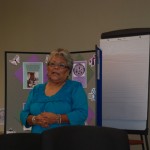
Article and photo Jeannie Briones
TULALIP, Washington- “One out of three native women will be sexually assaulted in their lifetime,” said Cheryl Neskahi Coan, Senior Residential Aide for the Tulalip Legacy of Healing Advocacy Center and Safe House.
Staff at Tulalip Legacy of HealingAdvocacyCenterand Safe House is working to educate the community about domestic violence and put an end to the cycle of abuse. “ “In Her Shoes ~ Native Version”, is an interactive workshop designed to help people understand what victims face in every day life, and opened to the community on October 30th. This Native version workshop held at the Tulalip Administration Building, focused on acts of abuse based on real-life stories of Native American women. This workshop builds off of the “In Her Shoes, Economic Justice Edition” workshop offered on October 18th at Tulalip.
“I really enjoyed the workshop,” said tribal member Charlotte Jones. “It allows people to really see what it’s like to be in that situation. I think that being able to literally walk in their shoes and make decisions that they would face will allow people to have a little more insight and compassion to victims and also for the perpetrators. It’s hard to be a victim, but on the other side, we need to help the perpetrators, to make sure that they don’t victimize further.”
In cases of domestic violence against Native women is committed by non-native perpetrators are usually not prosecuted due to jurisdictional limits in tribal courts and this can lead to reoccurring abuse. Non-natives committing acts of domestic violence against Native American victims are not being held accountable for their actions.
“In Her Shoes ~ Native Version”, explores the real life experiences of Native women in various situations such as, in a same gender relationship, with a disabled partner, in a traditional marriage, and as a career woman. The workshop also addresses the victim’s issues of intimidation, coercion, power, and the control that the perpetrator uses over the victim.
Workshop facilitators also use a series of visual aids called the Native Maze Map: Navigating Systemic Response to Battering. Flow charts show how complex domestic violence is.
“We came together to bring our tribal community together. Our wish is to have community members understand what domestic violence and sexual assault is. There is so much of that happening within our tribal community and throughout all of Indian country. It’s an issue that all tribal communities need to address,” said Cheryl.
After the workshop, participants discussed their overall perception of the victims and the perpetrators and what the participants gained.
“I think this program is a great opportunity for not only women, but men to be more involved,” said tribal member Melissa Cavender. She followed up by saying it’s important to educate the youth about the issues and prevention.
For more information, call the Tulalip Legacy ofHealingAdvocacyCenterand Safe House at 360-716-4100, Monday through Friday, 8:00 a.m. – 4:30 p.m. In case of after hours emergencies, call the Domestic Violence Services of Snohomish County 24-hotline at 425-252-2873 or for immediate help, call the Tulalip Tribal Police at 360-716-4608. For information about “In Her Shoes ~ Native Version” created by “Mending the Scared Hoop” visit www.mshoop.org
nie Briones: 360-716-4188; jbriones@tulaliptribes-nsn.gov
